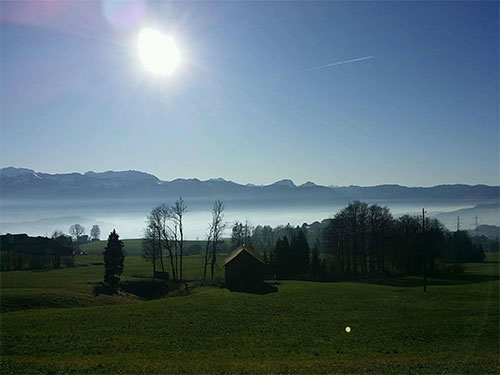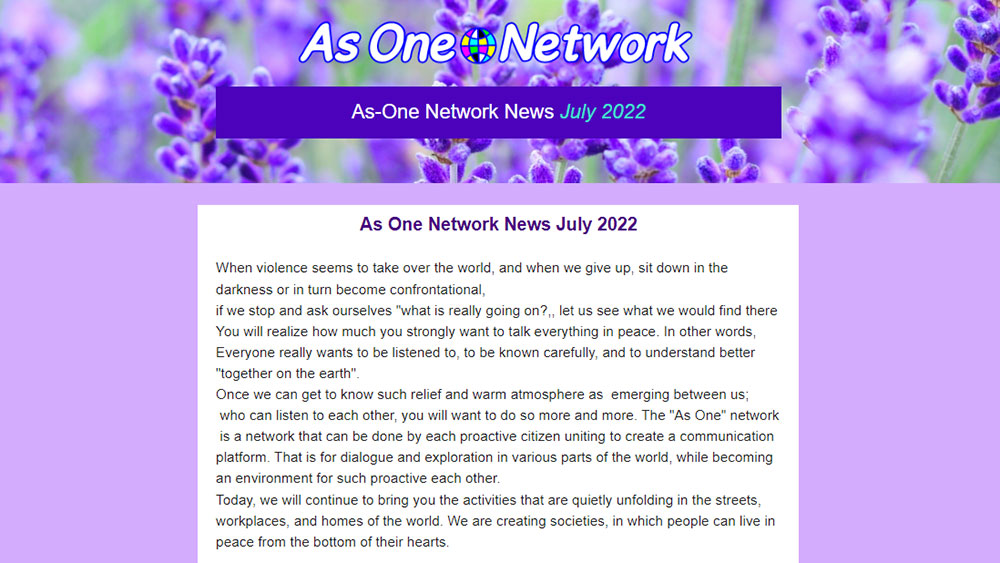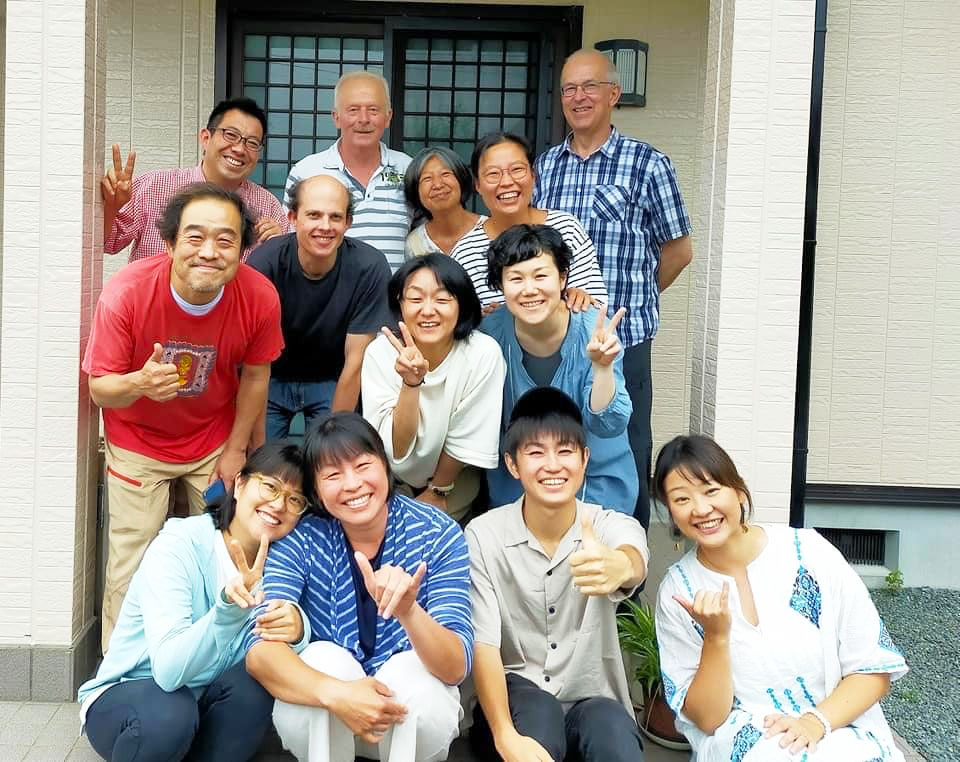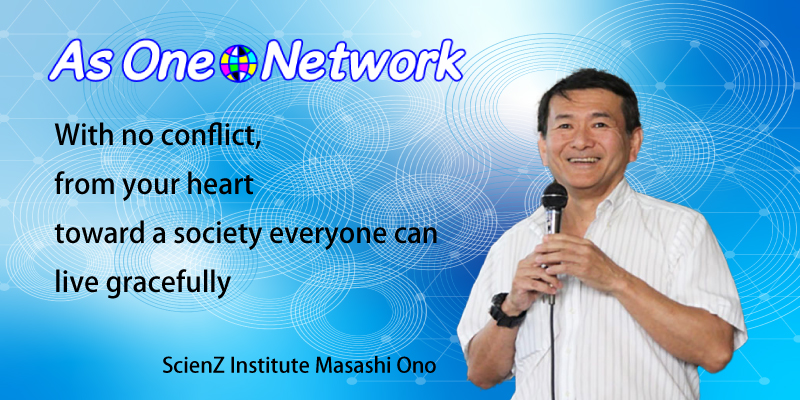Community Saijiki literary calendar
Big Boys
坂井和貴(Kazuki Sakai)
Climbing the gently sloping steps and standing on the embankment.
The great ocean stretches out before us.
"Ach, es ist das Meer~"
The sea breeze gently embraces the three big guys as they exclaim in admiration.
"Oh, es ist eine weiße Welle".
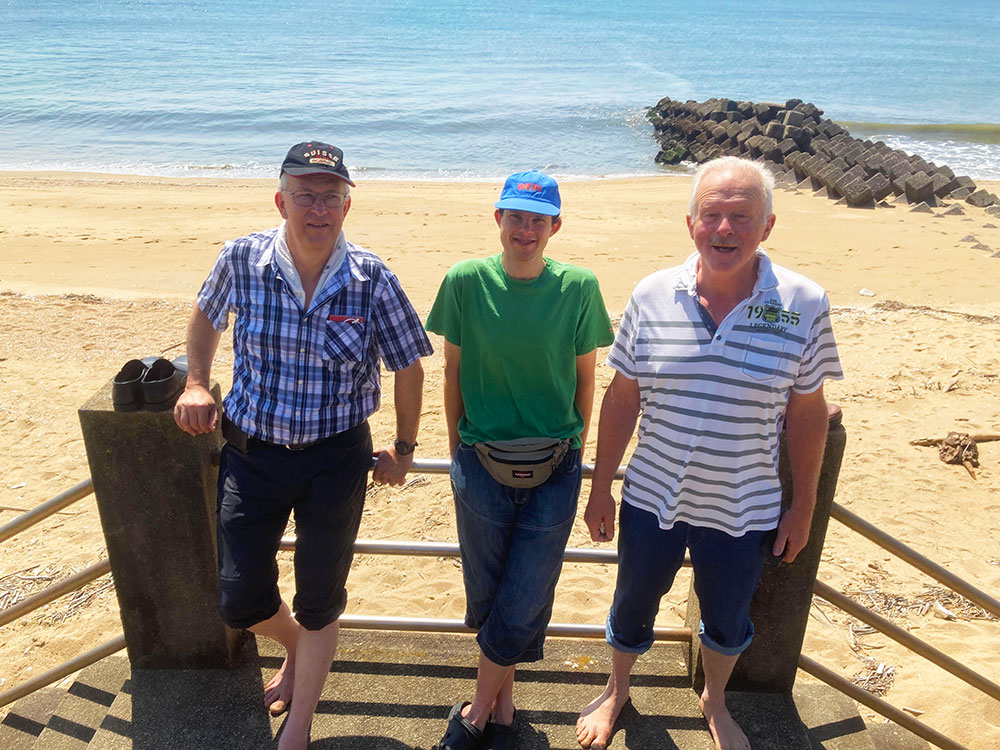 *From left to right, Patrick Alex Andre (visiting from Switzerland)
*From left to right, Patrick Alex Andre (visiting from Switzerland)
The white waves lapping here and there made us feel as if we were in the "living sea.
As if drawn by the waves, Patric descended to the beach, following the tetrapods. Andre, Alex, and I soon followed.
Patrick arrived at the beach first, quickly took off his shoes and socks, and pulled up his slacks to just above the knees, looking like he was ready to go. At that point, the three big guys instantly became "boys" and began to play with the sea.
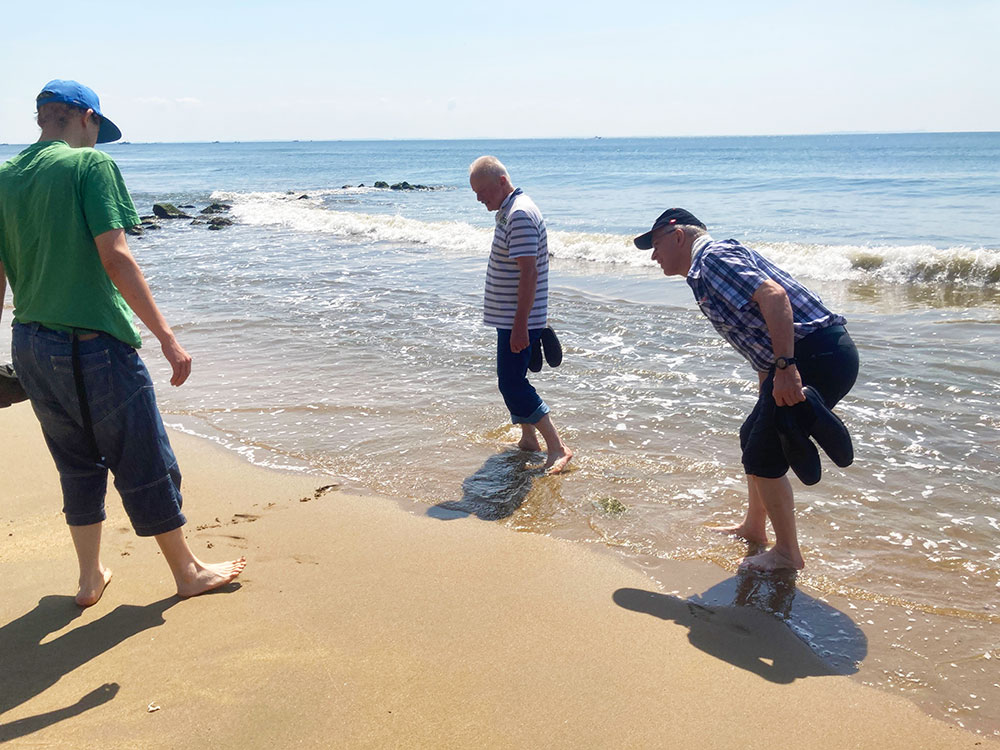
They went to the beach, jumped in the surf, picked up shells, talked to children fishing, and walked barefoot on the beach for nearly an hour....
For the three of them, who live in Switzerland and are surrounded by mountains and have no access to the sea, the beach was an exceptionally enjoyable place to visit. It was not until some time later that I realized that it was not only because of the unfamiliarity with the sea....
I met Patrick as a young man on my way to explore a new society that had never existed before. We have been friends for 30 years now, and we have been friends with each other since our children were in the same school, but I had never seen him in such a vivid state before.
If I' d left them alone, they would have made it all the way to the port of Nagoya.
So I said, "Come on, big boys. Let's go home now.
I said to them.
Until the day before, Andre and Alex had attended the June As One Seminar held in Suzuka. They had come all the way across the ocean from Switzerland, not for sightseeing or business, but just to experience a week of the seminar. Patrick was in as their interpreter.
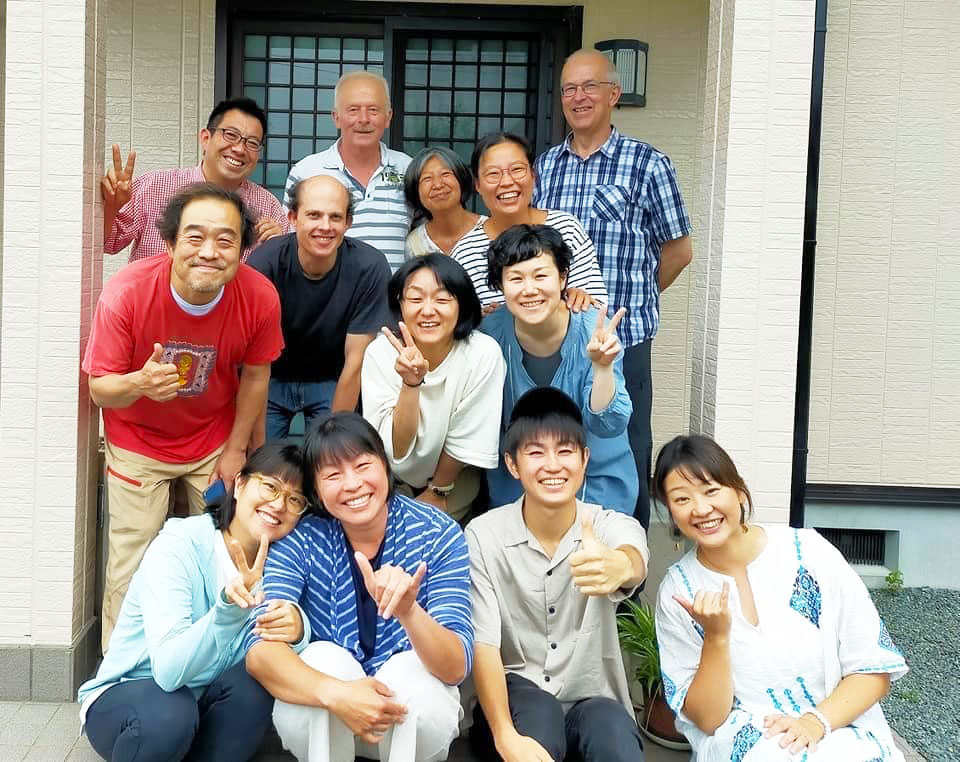 *Three people from Switzerland attended the [June As One Seminar].
*Three people from Switzerland attended the [June As One Seminar].
Andre has been working for more than 30 years in Switzerland to create a peaceful society without war and conflict. Even for him, the seminar was a shocking experience.
"I had always known this in my head, but for the first time, it really hit home to me. What has happened before is what has happened before, and from this point on, I really want to start from a zero," he said.
He revealed his heart with a "gentle red ogre" look on his face.
Alex, a 37-year-old man, seemed to be attracted to the ScienZ Academy, where people of his age are also studying, and he said, "I want to come back to Suzuka with my friends and partners in Switzerland to send me off. For me right now, studying at the Academy is the fastest way to get back to my true self." And.... Their eyes shone even more brightly than when they were frolicking in the sea.
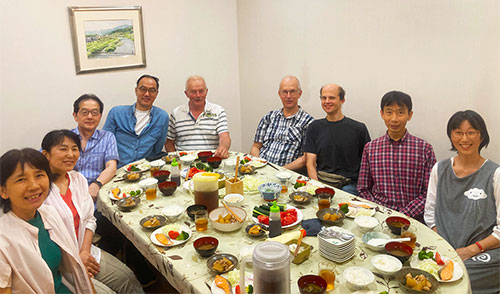 During their stay, they had dinner with members of the As One Suzuka community.
During their stay, they had dinner with members of the As One Suzuka community.
With the pandemic seemingly temporarily over, the number of visitors to the Suzuka community is increasing, not only from Japan but also from overseas.
The vegetable finishing area of the SUZUKA Farm is also crowded with newly enrolled academy students and participants in the hands-on experience and training programs.
Then, an "incident" broke out!
When Toshiyuki, a member of the farm since its establishment more than 10 years ago, popped into the busy finishing area. A young girl suddenly said to him
"Excuse me, are you here for your first experience?
Toshiyuki replied,
"No, actually, I've been working here for about 10 years.
The whole group burst into laughter.
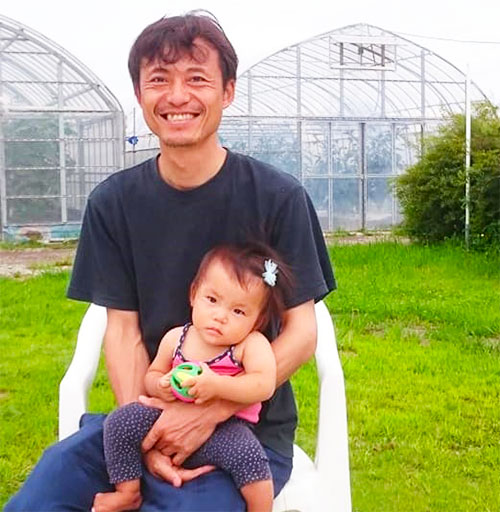 Toshiyuki Tanifuji and his daughter Hana-chan from SUZUKA Farm
Toshiyuki Tanifuji and his daughter Hana-chan from SUZUKA Farm
Toshiyuki is mainly engaged in planting, managing, and harvesting rice paddies and fields, and is often on the road, so he is not always at the finishing line. As you know, this is a common occurrence when there are a lot of new employees in any workplace or gathering, but it is still funny.
“There is no newcomer with such a dark, tanned face on the farm," said Toshiyuki.
By the way, it is not only people who are busy on the farm. Summer vegetables such as tomatoes, cucumbers, eggplants, and potatoes are being harvested in earnest. Starting with bright red ripe tomatoes, local customers are happily welcoming the vegetables picked in the morning.
One person who has visited the community many times recently is Shinichiro Hino. (a.k.a. Mr. Nissin).
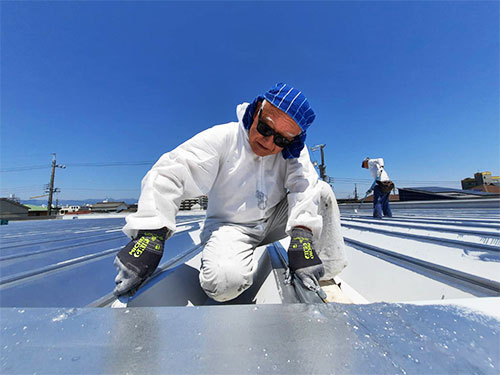 Shinichiro Hino, a member of the As One Network Okayama, also participated in the painting.
Shinichiro Hino, a member of the As One Network Okayama, also participated in the painting.
He joined the community members in painting the roof, which we introduced in our Saijiki last month, and played an active role.
He was enjoying painting as his own thing more than anyone else, and he said,
"I'm going to paint this roof.I'm not leaving until I'm done painting,"
he said, and eventually extended his stay to see it through to the end. It was hard to imagine that he was over 70 years old.
Mr. Nisshin, who is also a first-class architect at Hino Kankyo Design Laboratory, came down from Okayama two or three times before and after the event with his own hand to design buildings and facilities for the community.
"Mr. Hino, after all, can't we make this place more like this?"
Koichi, Ryu, and the other younger members of the community repeatedly asked him what they thought was an impossible task.
Mr.Nisshin responds to their repeated and seemingly unreasonable requests with, "Oh, yes, that would certainly be interesting.
Through these responses, I sense that something dormant within Mr. Hino is being drawn out.
“This is the ninth time I've had to rewrite a drawing...I've never had to do that before..."
He looks like a little boy as he happily says so.
I wonder what kind of buildings will be constructed by the combination of his skilled skills and his boyish heart.
And the day before yesterday
"Mr. Motoyama is starting work on the dining room addition here!
I sent an e-mail to him.
He replied, "I'll be there as soon as I finish my chores over here!
Nisshin-san's momentum knows no bounds.
He is truly "progressing day by day.
It is natural for animals to live "according to their instincts.
It is natural for human beings to live "according to their true hearts.
Then, what is the "true heart"?
What are the desires, will, and feelings that come from the heart?
We often say or hear the words " repulsion," "resistance," " defiance," "aversion," and the like, but what does it really mean?
I have never seen anyone, including myself, who " are repulsed, resisted, defiant, or averse from the bottom of their hearts. I don't think there is a single person who can do that.
Even if someone is repulsed or resists something, it doesn't seem to be from the "bottom of their heart. In fact, it may be very superficial.
What do I want to do "from the bottom of my heart"?
What do you want to do "from the bottom of your heart"?
A "person with a heart like a boy" is a person who is in direct connection with his or her true heart.
If we could live in an environment where we could live with each other with only our simple, heartfelt desires, wills, and feelings, what kind of day would we have, and what kind of life would we lead?
If only there was an environment where everyone could live "from the heart"...
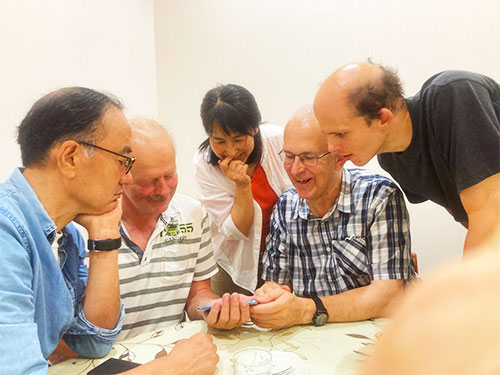
The morning after our visit to the ocean, Patrick wanted to catch the first train, so I dropped him off at the station around 5:00. He said he was going to do some work in Tokyo and take a night flight from Haneda to Zurich. In the car, we talked about Julia, Patrick's daughter who entered the ScienZ Academy this May.
"GOTTUN!"
I always feel sorry for Patrick, who is well over 190 cm, but Japanese cars are too small for him, and he inevitably hits his head when getting off the car.
As we were standing in front of the ticket gate, I said to him.
"Patrick, you are finally going to a seminar in Switzerland in July, aren't you?
"Yes, that's right!
Patrick said calmly.
"I'm looking forward to it."
I waved my hand and said.
“I'm sure we'll figure something out. See you later!”
He smiled mischievously and turned on his heel.
The As One Seminar will be held in Europe for the first time on July 17.
After years of preparation and traveling back and forth between Japan and Switzerland, Patrick will be hosting the seminar.
With the support of Andre and Alex.
With this seminar as a starting point, new horizons will expand from a corner of Europe.
With a gait that clearly showed what was already in his mind, Patrick disappeared onto the station platform.
"When I leave the Academy, I want to become someone who can conduct seminars in Europe with my father," Julia said.
Such words from Julia seemed to push the big boy Patric back.
"Wir sehen uns wieder, Brüder."
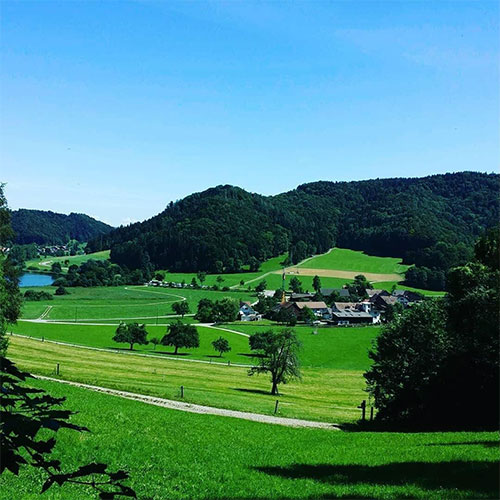 *Scenery of Switzerland The first as-one seminar is scheduled to be held in Switzerland in July.
*Scenery of Switzerland The first as-one seminar is scheduled to be held in Switzerland in July.
